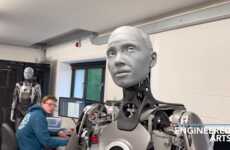
The World's First Human Robot Wedding Proves Love is Programmable
Michael Hines — April 5, 2017 — Lifestyle
References: scmp
One expert claimed that the world's first human robot wedding would take place by 2050. That guess was off the mark by a few decades as China's Zheng Jiajia recently married a robot he built. Jiajia is an expert in artificial intelligence. His new robot wife, named Yingying, is able to say a few words and identify Chinese characters and images according to the South China Morning Post. The world's first human robot wedding was attended by Jiajia's mother and friends.
Although Yingying has limited capabilities now the goal is to improve her over the years. Eventually the A.I. engineers wife will be able to walk and do some chores around the house. Now that the first human robot wedding has happened the flood gates may be opened for more such unions, especially in countries like China where finding a spouse can often be a cutthroat and exacting task.
Although Yingying has limited capabilities now the goal is to improve her over the years. Eventually the A.I. engineers wife will be able to walk and do some chores around the house. Now that the first human robot wedding has happened the flood gates may be opened for more such unions, especially in countries like China where finding a spouse can often be a cutthroat and exacting task.
Trend Themes
1. Artificial Intelligence Companions - Opportunities for developing fully-functional humanoid robots to keep company to the elderly or physical disabled, based on the results of the human-robot marriage.
2. Social Acceptance of Robots - As more and more people become more open to the idea of human-robot interactions such as marriage, this opens the door to a more connected society.
3. Personalizing Robots - As advances are made in AI technology, it is possible to customize a robot's personality -- optimistic, pessimistic, funny, sassy -- or even upload a deceased person's voice into their artificial system.
Industry Implications
1. Robotics - Advancements in robotics technology will push further and faster than before, given the unique inclination to love and companionship among humans.
2. Elder Care - With concerns about not having enough people with caregiving skills, there is a potential for broader implementation of humanoid robots to provide assistance in elder care, beyond existing health services.
3. Funeral Industry - As more people consider AI life-partners and companions, the question of how to approach funerals, burial, and other after-life customs becomes an industry question.
5.9
Score
Popularity
Activity
Freshness























